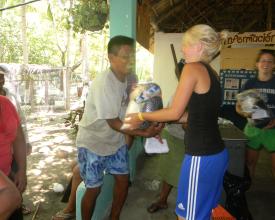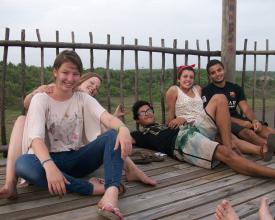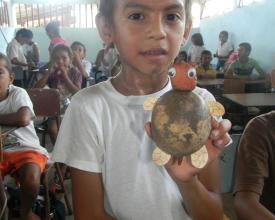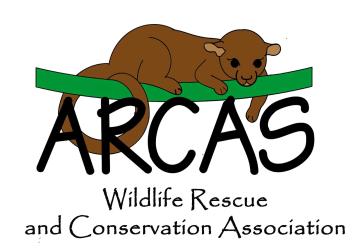
Integrated approach for sea turtle conservation
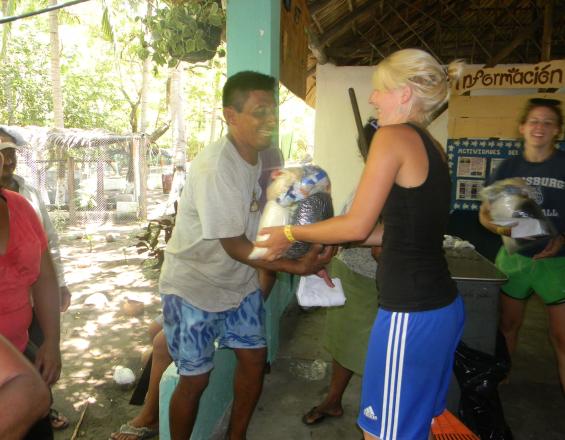
ARCAS implements conservation activities on the Pacific coast of Guatemala to counteract threats to leatherback and olive ridley turtle populations from overharvesting by local egg collectors. We work with local communities by training, supporting and advising them in the protection of marine ecosystems. Environmental education helps to ensure long-term sustainable community development, and volunteers and sponsors are invited to participate in conservation activities.
Contexto
Défis à relever
- Overharvesting of sea turtle eggs
- Low environmental awareness amongst local people
Ubicación
Procesar
Summary of the process
ARCAS, with the help of volunteers, has been working for more than fifteen years in the Hawaii area of Guatemala. We strive to instill a sense of responsibility for local resources and culture in the youngest generation. Activities are carried out in villages using a number of formats including classroom based learning games, plays and puppet shows and also field trips to take the children on-sight to help better explain the premise and importance of various habitat conservation programs, dedicated to the conservation of the incredible marine ecosystems biodiversity of Guatemala. We have been successful achieving this general objectives, with the implementation of the building blocks we describe by pursuing the following objectives.
- To strive for the conservation the conservation, preservation, protection and research of local flora and fauna rescue, rehabilitate and reintroduce into their natural habitat wild animals seized from illegal traffickers.
- To raise awareness among Guatemalans of the need to conserve natural resources through a program of education and information Dissemination.
- To develop and promote economic alternatives in rural communities to the unsustainable consumption of natural resources.
Building Blocks
Volunteer engagement
Volunteers from all over the world help us in implementing the conservation activities of our program: look for sea turtle nests to protect the eggs from poachers, maintenance of the hatchery, support in our environmental education program, analysing research data that we are constantly generating, and helping in the rehabilitation of species we received at the center.
Enabling factors
- Volunteers are trained by professional experts
- Being transparent regarding to incomes, data and results
- Volunteers are made aware of the importance of their on-going support for the programs’ successes
- Given the lack of government resources, without them we would not have the financial resources and manpower necessary to meet the challenges that we face
Lesson learned
Our experience demonstrates that volunteers enjoy working and feeling responsible for producing project results. They like to experience new challenges and feel part of the team. However, many volunteers have little or no experience working in developing countries, and must be well-orientated and managed so that they contribute to the project goals, are aware of local cultural norms, and follow the ARCAS methodology. A successful volunteer/intern/ecotour program requires constant management, planning and communication.
Data collection for decision making
In our programme in the region of Hawaii, and at 8 other points along the Guatemalan Pacific coast, we collect sea turtle hatchery data, population data (daily GPS crawl counts), and count other marine strandings. This data is used to estimate the abundance of sea turtle populations that came to lay their eggs along the Guatemalan coastline. Since we have been struggling with many strandings, this data is very useful to develop conservation strategies.
Enabling factors
- Follow established protocols and standardized procedures
- All data have to have a backup
- Researchers have to make sure that volunteers are following the protocols
- Having clear conservation goals
- Keeping data gathering as simple as possible with economical, replicable equipment and methods
Lesson learned
ARCAS is a leader in marine data gathering and research in Guatemala. Given the fact that no one else in the country is collecting this data, and we have been collecting it since 1997, our data is incredibly valuable for sea turtle conservation. We have learned that it is very important to have clear conservation goals, to keep the data gathering as simple as possible (be strategic in terms of your budget), to continuously collect data, to be transparent and not hoard data, and provide a platform for the participation of communities and students in research efforts. It is also crucial to get the data into the hands of important decision-makers and community leaders.
Cultural exchanges and integration of local knowledge
In our program in the region of Hawaii, we are creating a framework whereby local people and volunteers can share their knowledge and culture, where the safety of the volunteers is ensured, and whereby locals can be compensated economically for these non-extractive activities.
Enabling factors
- Establish a sustainable and permanent presence in the community, and have an intimate knowledge of local micropolitics.
- Seek feedback from key local stakeholders.
- Have a solid institutional presence and fulfill all legal requirements with government agencies.
- Share experiences with other projects in the region.
- National and international fundraising capability.
Lesson learned
- It is important to first train local people in good practices, and understand the local knowledge.
- Evaluate the program as to how it is meeting conservation goals and helping local communities.
- Place a high priority on the physical safety of the volunteers.
- Make sure the volunteer and the local resident feel a sense of stewardship for the project.
- Set strict guidelines in terms of personal relationships between volunteers and locals.
Environmental education program in local communities
Environmental education is one of the foundations of any of our conservation efforts. In our program in Hawaii region, ARCAS works with six communities, carrying out a variety of activities such as beach clean-ups, releasing hatchlings, reforestation, environmental fairs, field trips, and presentations in local schools. In order to inform the local kids of the importance of taking care of their resources, we make this our priority. The local communities have been well educated by ARCAS.
Enabling factors
The Guatemalan public school system is very weak and there is a great demand by teachers, parents and administrators for collaboration. Volunteers contribute to educational activitities by giving English classes on environmental topics, and organizing beach clean ups.
Lesson learned
Environmental education is a priority in local communities. The kids are the ones that are going to take care of wildlife in the future. It is also important to be a responsible and constant partner of local schools, students and teachers, and to evaluate the effectiveness of educational efforts.
Turtle eggs-for-food exchange programme
Most sea turtle egg collectors are men, and often the income from egg sales is spent on alcohol or otherwise does not benefit the family. Using food supplements from the government and from other donors, ARCAS initiated an egg-for-food program whereby sea turtle eggs are exchanged for basic food. This program has been successful in improving local food security and nutrition (in a country that has systemic malnourishment) and trying to increase the participation of women and children in the egg collection program.
Enabling factors
- Ability to fundraise.
- Involving volunteers in the exchange.
- Explaining the importance of the program to communities and sponsors.
Lesson learned
The egg-for-food program has been very successful in involving women and children in the sea turtle egg collection system, and trying to ensure that the whole family benefits from the program, not just the men. The exchange needs to be carefully managed, and it entails a lot of hard work to ensure that the food goes to the family. The program has also been fundamental in demonetarizing the sea turtle egg trade and reducing the role of middlemen.
“Sponsor a Nest”-Ecotourism
ARCAS manages a "Sponsor-a-Nest" program whereby an individual can sponsor a sea turtle nest and these funds are used to buy food, which are then exchanged for sea turtle eggs. Many of these sponsors then come to the Hawaii Park with their family or friends to release hatchlings on the beach together with local guides.
Enabling factors
- The growing tourism industry on the Pacific coast of Guatemala.
- Interest of tourists in supporting environmental and social causes.
Lesson learned
Sponsors are usually families who come to the hatchery during their holidays. It is important to recognize the support of these sponsors and to communicate with them so they understand where their donation is going.
Impacts
- Marine turtle eggs buried in the pacific coast of Guatemala have risen from 12% to 40% (1999-2013)
- Environmental education: More people are willing to support and donate for the conservation of sea turtles.
Beneficiaries
- Populations of Olive ridley turtles that lay down their eggs along the Guatemala coast
- Local people from neighboring municipalities
- Local fishermen
- National & foreign tourists
Sustainable Development Goals
Story
The "Ralley Parlama"
To achieve a success with a conservation program, we need the support of local communities and especially kids! Implementing a community development strategy is the first phase of the project to acheive sustainable and long-term impacts. In 2013 and 2014 one of the most effective and popular educational programs carried out in the regions of Hawaii and El Rosario, Guatemala was "Rally Parlama". Named after the targeted species, this program encouraged local children to donate “Parlama”, olive ridley sea turtle eggs to an ARCAS hatchery. In exchange for eight dozen eggs, the donors were rewarded with a 4-day, all-expenses paid, cross-country tour to visit other national parks and protected areas. As most residents of the area live below the poverty line, many of them have never left their coastal area. The trip was an incredible opportunity for these children to experience other beautiful natural and cultural areas of their country. Visits to such stunning sites by such marginalized people, helped create a lasting impression and deeper support for ARCAS’ conservation efforts. The "Rally Parlama" program was a huge success for ARCAS because it involved the community to support its own sea turtle population and gave local children and community leaders the chance to visit some of Guatemala’s most beautiful, natural and iconic sites. The program brings our parks closer to communities and generates greater support for the NGO. It is so dear to us and we look forward to next year's adventure!
